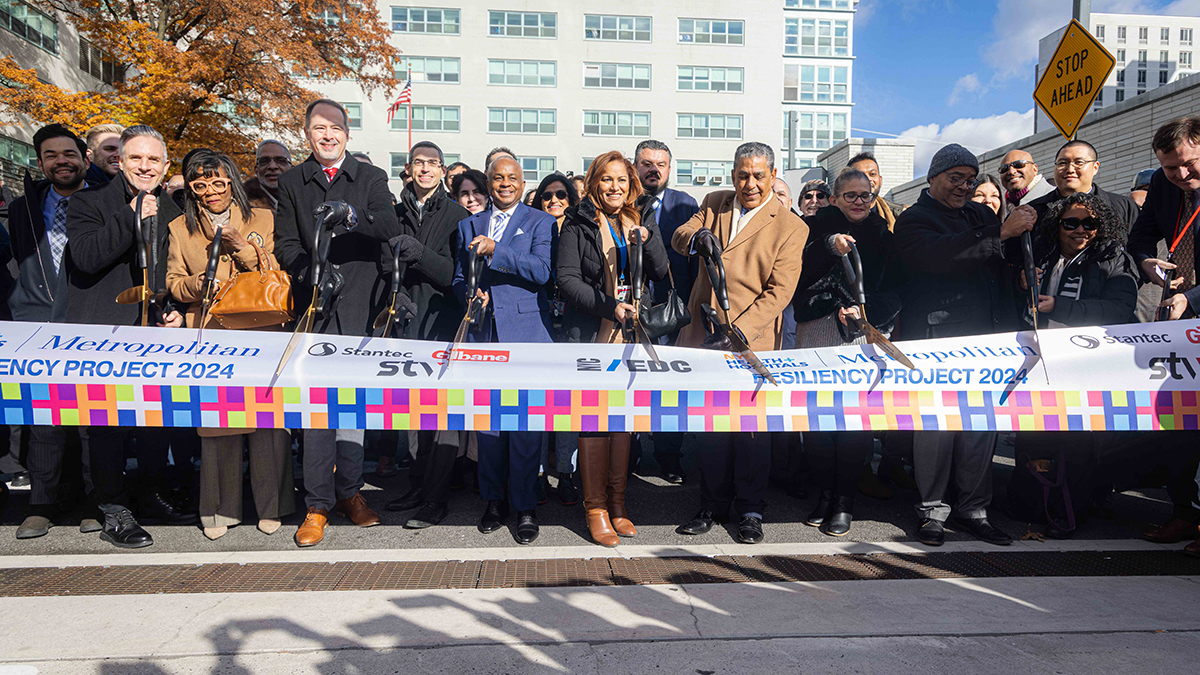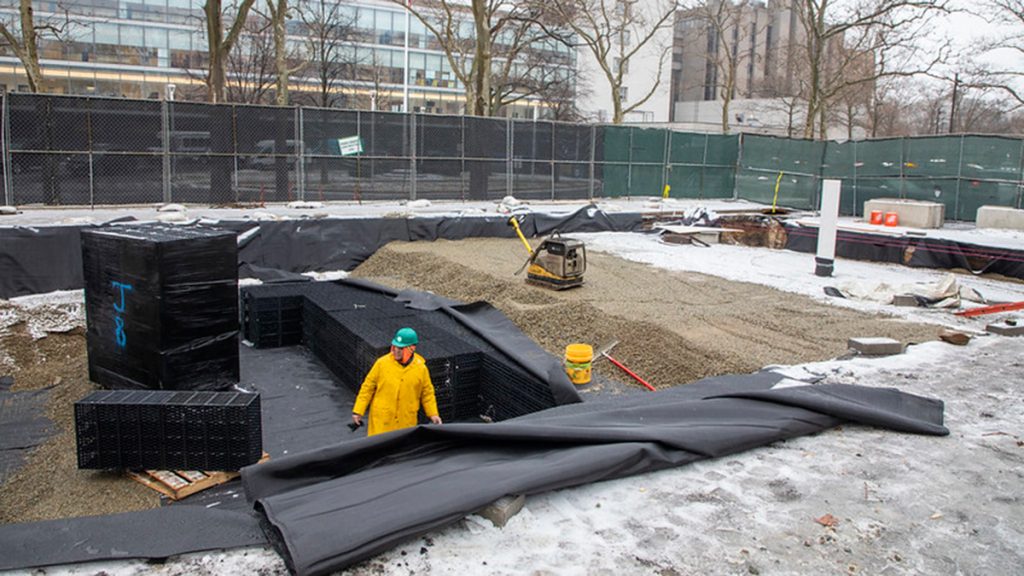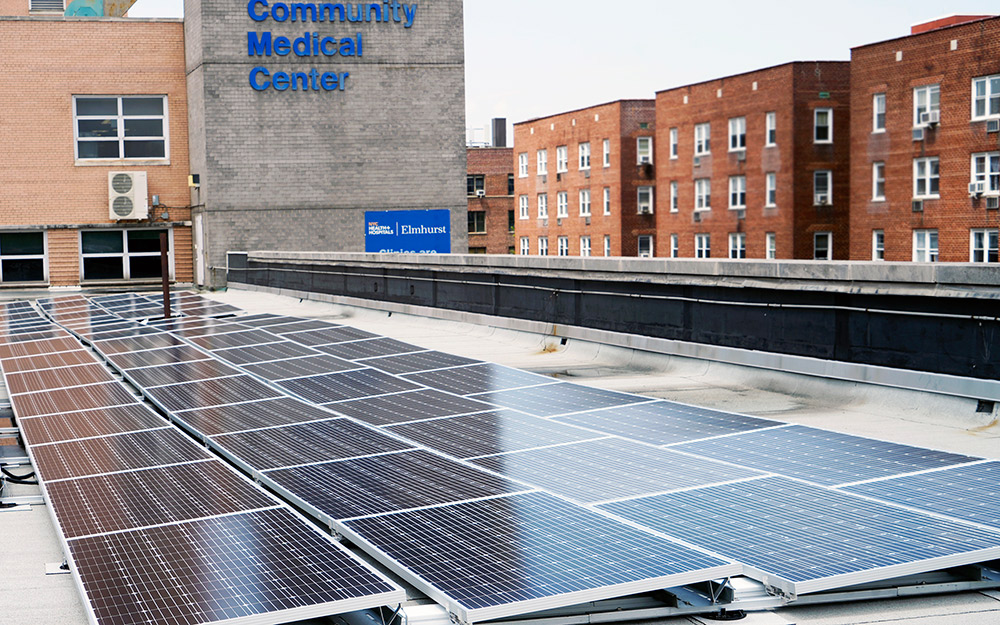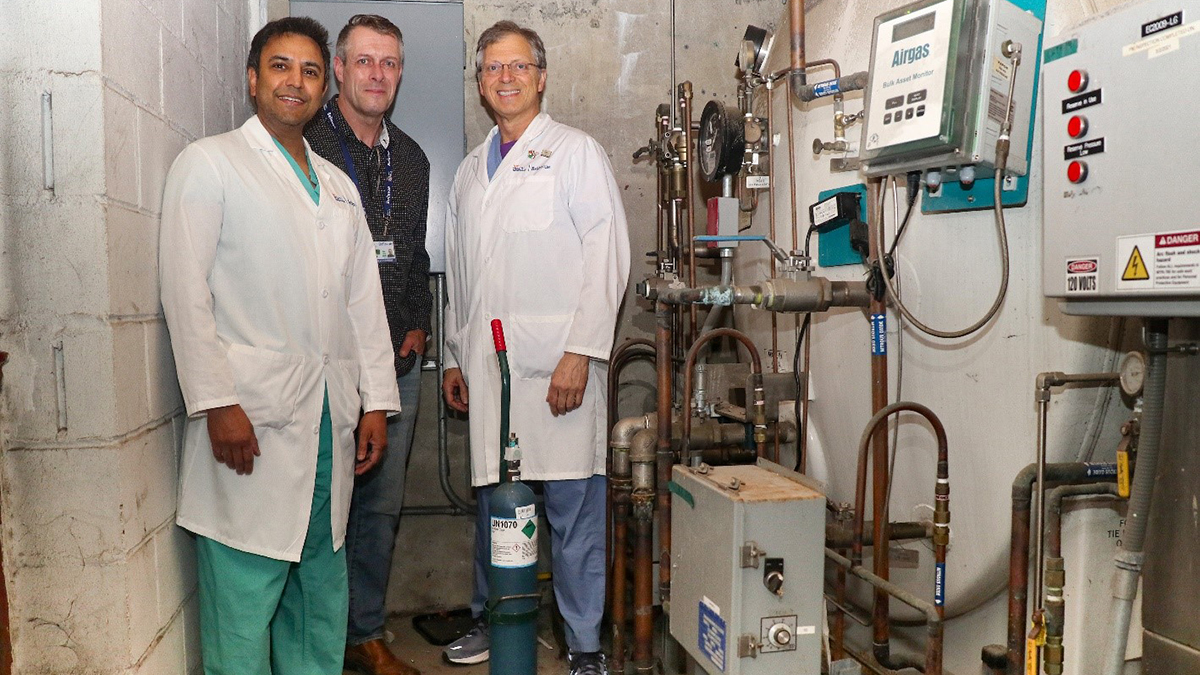NYC Health + Hospitals Details Systemwide Climate Resilience and Sustainability Achievements Since Earth Day 2024
Since Earth Day 2024, the public hospital system has reduced annual operational carbon emissions by nearly 6,000 metric tons and achieved nearly $2.5 million in annual energy cost savings NYC Health + Hospitals completed climate resilience projects at NYC Health + Hospitals/Metropolitan and Jacobi and sustainability and efficiency projects at NYC Health + Hospitals/Elmhurst, Queens, and Lincoln The health system has now achieved a 31% reduction in operational carbon dioxide emissions since 2006 and is continuing its efforts to hit a 50% reduction target by 2030
Apr 22, 2025

New York, NY — NYC Health + Hospitals today announced its systemwide climate resilience and sustainability achievements since Earth Day 2024, including a reduction in the public health system’s annual operational carbon emissions by nearly 6,000 metric tons and nearly $2.5 million in annual energy cost savings. Over the last year, NYC Health + Hospitals completed two critically important climate resilience projects, including the completion of a floodwall protection system at NYC Health + Hospitals/Metropolitan and stormwater drainage upgrades at NYC Health + Hospitals/Jacobi. The public health system continued work to make its hospital facilities more sustainable and efficient, appointing its first Chief Decarbonization Officer, completing its first-ever solar panel installation at NYC Health + Hospitals/Elmhurst, and completing energy efficiency upgrades at NYC Health + Hospitals/Queens and Lincoln. In addition, last week, the public health system announced a 52% annual reduction in carbon emissions in its anesthesia practice as a result of deactivation of central piped nitrous oxide and optimized use of anesthetic gases. Together, these achievements demonstrate significant progress toward meeting the goals the public health system outlined in its Climate Resilience Plan, announced on Earth Day 2024. NYC Health + Hospitals has now achieved a 31% reduction in operational carbon dioxide emissions since 2006 and is continuing to advance efforts to achieve a 50% reduction by 2030.
“At NYC Health + Hospitals, decarbonizing our buildings and operations is key to creating healthier, more resilient care spaces,” said NYC Health + Hospitals Chief Decarbonization Officer Omer Cabuk. “By upgrading HVAC systems, optimizing building controls, improving energy efficiency, and installing renewable energy where feasible, we’re cutting emissions while enhancing indoor air quality and long-term sustainability-ensuring our facilities remain safe, efficient and climate ready for the communities that we serve.”
“These achievements bring us closer to meeting our ambitious climate goals, but we know that our work is far from over,” said Anna Speed, Director of Sustainable Design and Resiliency at NYC Health + Hospitals. “By continuing to implement sustainable design, energy efficiency, and climate resilience measures, we are building a healthier, more sustainable future for all New Yorkers.”
“I am very proud to be part of an organization that has prioritized and integrated decarbonization and climate resiliency measures into its day to day operations and future planning,” said Tennille Santos, Director of Energy Management at NYC Health + Hospitals. “Continuous success in achieving our goals is only made possible by the consistent effort and support of NYC Health + Hospitals’ engineers and staff.”
Since the Climate Resilience Plan was issued, the public health system has completed the following climate resilience projects:
- Completed construction of a new flood protection system at NYC Health + Hospitals/Metropolitan enabling the hospital to withstand a one-in-500-year storm event. The Metropolitan Hospital Floodwall Resiliency Project, a partnership with the NYC Economic Development Corporation and community stakeholders, was initiated in 2016 following Hurricane Sandy to address the hospital’s flooding vulnerabilities given its close proximity to the East River and the growing climate risks of coastal storm surge and extreme rainfall. The project will protect the hospital campus from significant flooding caused by heavy rain and storm surge, which are becoming increasingly common, and ensure patients receive uninterrupted critical care.
- Installed stormwater drainage and storage systems beneath three of the parking lots at NYC Health + Hospitals/Jacobi. The now-completed stormwater drainage and storage systems can capture more than 5 million gallons of water a year. The project, coordinated in partnership with the NYC Department of Environmental Protection, helps protect the hospital’s facilities, staff, and visitors, and creates additional capacity in the larger Pelham Parkway sewer system to reduce flooding throughout the neighborhood. Creating a stormwater flood mitigation system will ensure staff and patients can continue to access the hospital for critically needed services during periods of heavy or extreme rainfall.

NYC Health + Hospitals has established a robust decarbonization and sustainability agenda, making energy efficiency, electrification, and renewable energy initiatives for the built environment central to its policy, operations, and capital planning. As a result of its ongoing sustainability efforts, between Earth Day 2024 and 2025, the public hospital system has reduced its annual carbon emissions by nearly 6,000 — the equivalent of removing over 1,400 cars from the roads.
The public health system has recently reached the following sustainability and efficiency achievements:
- Installed the first-ever solar panel installation at NYC Health + Hospitals/Elmhurst in January 2024. The 55KW installation, completed in partnership with the city’s Department of Citywide Administrative Services (DCAS, supplements the hospital’s daily energy use with cleaner, greener, renewable power.

- In May 2024, NYC Health + Hospitals appointed Omer Cabuk, ME as its first ever Chief Decarbonization Officer. Omer serves as an executive-level strategist, partnering with leadership teams, capital project leads, facilities management staff, and other key stakeholders to pursue the organization’s robust decarbonization initiatives, including adhering to the targets set by Local Law 97, which mandates a 40% reduction in operational emissions by 2025 and a 50% reduction by 2030.
- Completed large-scale energy efficiency upgrades at NYC Health + Hospital/Queens to enhance the hospital’s sustainable infrastructure and heating, ventilation, and air conditioning systems. These upgrades, completed in partnership with DCAS, have created a healthier environment for patients and staff while transforming the facility into a greener, more energy-efficient healthcare hub. The $8.2 million energy project is expected to save 1.4 million kWh of electricity and 218,000 therms of natural gas annually, cutting greenhouse gas emissions by approximately 1,500 metric tons of CO2e per year and generating more than $400,000 in annual energy savings.

- Phase I of a comprehensive energy upgrade project at NYC Health + Hospitals/Lincoln was completed in early 2024, with Phase II targeting completion by June of this year. Together, the two phases represent a $41 million investment and include major energy efficiency improvements to the hospital’s air handling units, lighting systems, and fan coil units. Once project is complete, the upgrades are expected to generate $1.7 million in annual energy savings and reduce carbon emissions by approximately 3,200 metric tons per year.
- Achieved a 52% annual reduction in carbon dioxide equivalent (CO₂e) emissions in its anesthesia practices systemwide, an achievement driven by the deactivation of central piped nitrous oxide (N₂O) and optimized use of anesthetic gases. Four of the public health system’s hospital facilities, including NYC Health + Hospitals/Bellevue, Elmhurst, Jacobi, and North Central Bronx, have fully deactivated the use of central N₂O in their anesthesia practices. Across the public health system, the collective reductions in CO₂e emissions as a result of deactivating central N₂O systems and reduced delivery of anesthetic gases amounts to over 5,000 metric tons of carbon dioxide, or the equivalent of taking approximately 1,100 gas-powered cars off the roads.

- In addition to ongoing infrastructure upgrades, NYC Health + Hospitals has reduced climate emissions through its commitment to serving plant-based meals to its patients. The health system has served over 2 million plant-based meals since the program launched in March 2022. In addition to the considerable health benefits for patients, the plant-based meals served in 2023 led to a reduction in carbon emissions of 36% and a cost savings of 59 cents per meal.
The health system has now achieved a 31% reduction in operational carbon dioxide emissions since 2006. Decarbonization often involves upgrading building infrastructure with more efficient, modern systems, such as better insulation, high-efficiency HVAC systems, and advanced building materials. Such improvements can make buildings more resilient to external climate conditions and disasters, maintaining internal conditions more effectively and ensuring patient comfort and safety. In addition, these improvements also reduce building energy needs and extend the operational time of emergency backup systems, which contribute toward its resiliency.
###
MEDIA CONTACT: PressOffice@nychhc.org
#067-25
About NYC Health + Hospitals
NYC Health + Hospitals is the largest municipal health care system in the nation serving more than a million New Yorkers annually in more than 70 patient care locations across the city’s five boroughs. A robust network of outpatient, neighborhood-based primary and specialty care centers anchors care coordination with the system’s trauma centers, nursing homes, post-acute care centers, home care agency, and MetroPlus health plan—all supported by 11 essential hospitals. Its diverse workforce of more than 43,000 employees is uniquely focused on empowering New Yorkers, without exception, to live the healthiest life possible. For more information, visit www.nychealthandhospitals.org and stay connected on Facebook, Twitter, Instagram and LinkedIn.